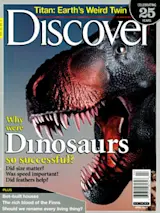The very model of evolution?
Skepticism frequently seems to be thrown to the winds when it comes to evolutionary theory. “Testing Darwin” [February] is a case in point. The value of a model is closely linked to how accurately it represents reality, but the computer model in the article is lauded for how accurately it represents the researchers’ concept of evolution, not how closely it represents living things. The article states, “After more than a decade of development, Avida’s digital organisms are now getting close to fulfilling the definition of biological life.” Before organisms
can reproduce, let alone become part of an evolutionary process, they must conduct metabolic activities. Yet philosopher and Avida team member Robert Pennock says of the program’s organisms: “Metabolism? Maybe not quite yet, but getting pretty close.” This approach is most likely due to the fact that it has been easier for philosophers to grasp biological evolution than basic chemistry. The problem is, you can’t have biology without chemistry. Models that virtually ignore the chemistry of life should be greeted with skepticism.
Carl Rardon
Prospect, Ohio
Skepticism is indeed a virtue in science, but here one’s skepticism must be directed to the supposed necessity of “metabolic activities” and the relevance of “basic chemistry.” Metabolism and evolution are separable. Digital organisms in Avida can reproduce, and they can evolve. It is a common misunderstanding of evolution to think that the chemistry of life is necessary for this. Darwin knew nothing of DNA or RNA, and the evolutionary process he discovered need not be limited to those chemical substrates. Biologists regularly model aspects of living processes mathematically without any reference to chemistry, just as physicists can model the motion of masses without reference to their chemical composition. For many evolutionary hypotheses we do need to consider the specific chemical makeup of an organism, but for many others that is irrelevant, and Avida’s digital organisms are as accurate a model as we skeptical scientists could hope for.—Robert T. Pennock, Lyman Briggs School of Science, Michigan State University
The computer modeling presented as evidence for evolution in “Testing Darwin” does no more than provide support for what is already known. Microevolution—that is, the development and adaptation within a species—is well documented and even mentioned in the article. The problem is that so many scientists assume they can extrapolate the results to macroevolution. This computer model shows no evidence of bacteria becoming alligators—they simply become smarter bacteria.
Graham Armitage
Nottingham, New Hampshire
The “microevolution” challenge stems partly from a simpler misunderstanding. Biology textbooks define the difference between micro- and macroevolution as a matter of degree. Allowing only change within a species reflects a creationist view that the created kinds cannot speciate. Creationists split in the 1930s over whether to allow limited speciation within kinds (there are many species of bacteria and crocodilians, after all), with the liberals accepting the evidence for such evolution. Conservatives like Byron C. Nelson said that such a compromise would open “the door of evolution so wide that I, for one, don’t see a place to shut it.” He was right. There is no essential difference between adaptations “within” a species and those that create new species, so if evolution has the power to do the one it requires no extrapolation to get the other. That may be why intelligent design (ID) creationists like Paul Nelson, Byron’s grandson, reject even microevolution that involves complex adaptations—they can’t even abide bacteria getting smarter. That would be the evolution of intelligence!—Robert T. Pennock
It’s interesting that you assert that the Avida software program proves the theory of evolution when, in fact, it does more to prove the theory of intelligent design. Avida’s creators have intelligently designed computer algorithms that are capable of evolving. Without the participation of the creators, the digital organisms would not exist. Furthermore, the algorithms do nothing without the creators’ rewarding the desired behaviors. It is laughable to assert that a system that requires the creation and guidance of a higher intelligence in order to evolve somehow proves evolution.
Rich White
Bedford, Texas
ID creationists claim that natural processes cannot produce adaptational complexity without purposeful intelligent design, either in a chemical or a virtual system. It is true that a particular gene of an Avidian that evolved to perform the software operation called equals is complex in this sense—a specific, complex sequence of instructions produces the function. That particular piece of code is the analogue of some complex biological organ or process. But no one programmed it. Even when we reward a function in an experiment, we don’t specify how to code it. That is no different from how nature positively rewards useful functions. Evolution doesn’t need us. We do not “intervene” to “guide” or “smuggle in” the design. There is just one underlying algorithm at work in Avida, the basic evolutionary law of natural selection of heritable random variation. We did not create that law; Darwin
discovered it, and Avida shows that it works. —Robert T. Pennock
Facing our energy crisis
I appreciated the interview with chemist Rick Smalley [Discover Dialogue, February], but his approach to the world’s energy crisis is backward. We should focus not on impossible power-generation goals, transmission, and storage but rather on efficiency and conservation. We could more than halve our energy use by increasing the use of technology like compact fluorescent lightbulbs and passive solar and geothermal heating. Combining these with local solar, wind, and nuclear power plants could reduce the inefficient electric-transmission grid. Smalley’s nanotechnology could then be focused on further improvements in energy efficiency. I also disagree that solving our energy problems will take “presidential leadership.” The executive branch is effectively controlled by the carbon industry for the next four years, and our campaign finance laws ensure that large corporations will continue to dominate government policymaking. We must take the lead by converting our own autos and homes to efficient technology and by supporting local and state government initiatives that promote efficiency and alternative energy sources.
Tom Ribe
Santa Fe, New Mexico
ERRATUM
The orchid labeled 4b on page 31 in “Testing Darwin” is incorrectly identified as Cypripedium acaule. The flower is a subspecies of Cypripedium calceolus, also known as the yellow lady’s slipper.














